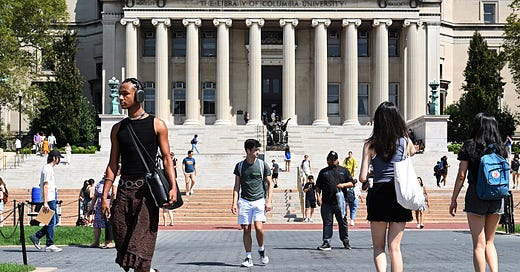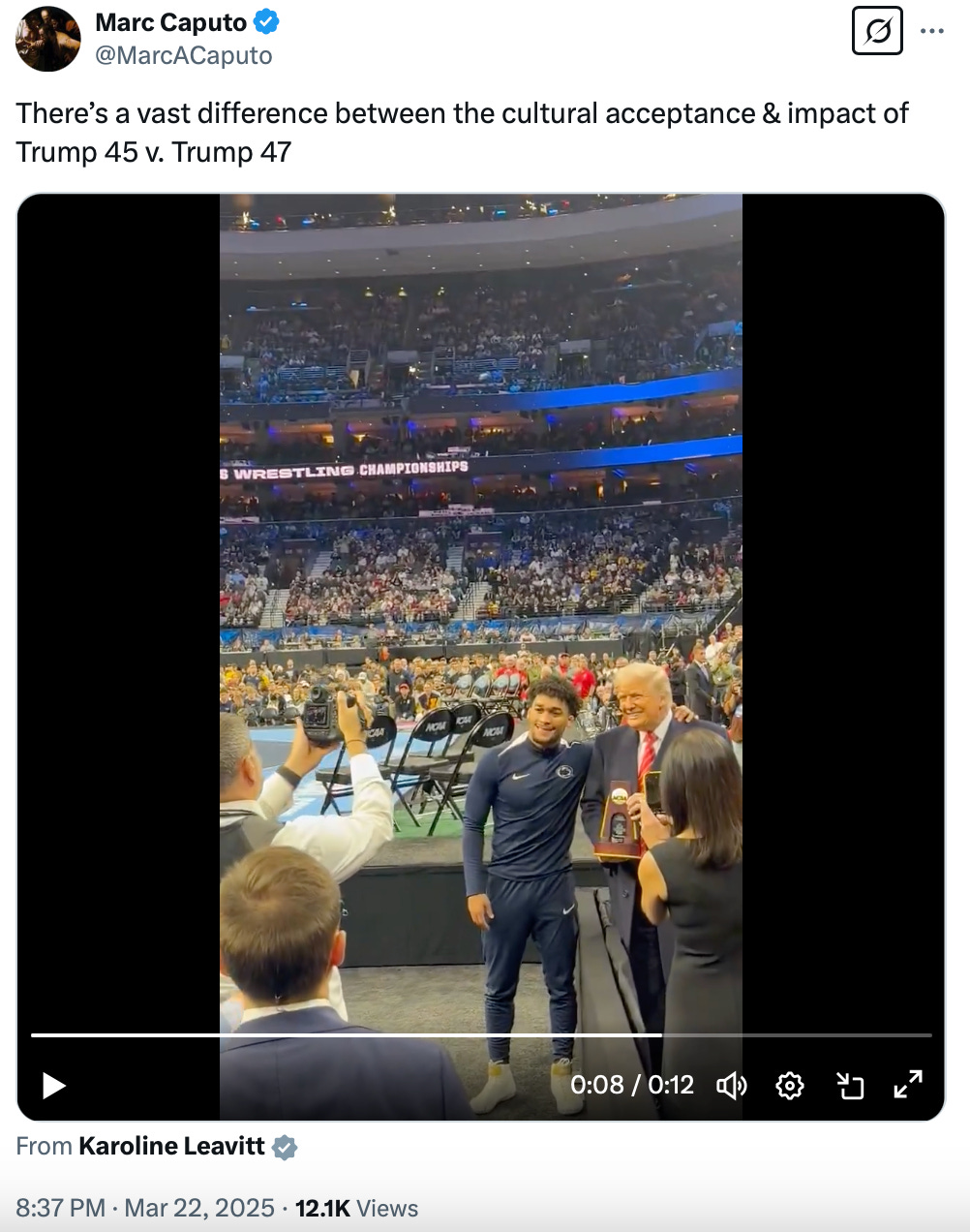President Trump issued an executive order on Friday with few apparent analogues in White House history.
The order rescinded a directive Trump had signed just one week earlier — already unusual by itself — directing government officials to target the white-shoe law firm Paul Weiss, by revoking security clearances held by the firm’s lawyers, limiting their access to government buildings, reviewing government contracts with the firm, and even, “to the extent permitted by law,” urging agencies to refrain from hiring the firm’s employees.
Three reasons were given for the initial order. One was the firm’s emphasis on diversity in hiring, although Trump’s own order acknowledged that that hardly made the firm unique: “nearly every other large, influential, or industry leading law firm” shares that emphasis, the president wrote. The two other reasons are what set the firm apart: its involvement in a pro bono lawsuit against the Proud Boys and the Oath Keepers for their role in the January 6th attack, and its hiring of Mark Pomerantz, a prosecutor who worked on the New York criminal investigation of Trump that ultimately led to his first indictment.
It was an extraordinary move by the federal government to target a law firm because it had hired people and brought lawsuits the government disagreed with. But what came next was equally extraordinary: the president personally entered into an agreement with the firm, a private company, to shape its business practices.
In his Friday follow-up order, Trump announced that Paul Weiss had “indicated that it will engage in a remarkable change of course.” His initial order would be undone as a result.
The details of the deal between Paul Weiss and the Trump administration are a bit shaky, because there are three relevant sources: a Truth Social post by Trump, announcing the firm’s “agreement with the president”; the Friday executive order formalizing the deal; and an internal email from Paul Weiss chairman Brad Karp. All three describe the agreement differently.
The executive order and Truth Social post announce that Paul Weiss has agreed to take on pro bono lawsuits and hire lawyers representing a wider spectrum of political beliefs. Karp said only that the firm had “reiterated our commitment to viewpoint diversity.”
The executive order says that Paul Weiss has committed to practicing “merit-based hiring, promotion, and retention, instead of ‘diversity, equity, and inclusion’ policies.” The Truth Social post goes even farther, announcing that a team of experts — “mutually agreed upon” (with the White House? With Trump himself? It wasn’t clear) — would “conduct a comprehensive audit of all of its employment practices.”
Karp’s email mentions no such audit, and does not include a commitment to end DEI policies. “While retaining our longstanding commitment to diversity in all of its forms, we agreed that we would follow the law with respect to our employment practices,” the chairman wrote.
The executive order says that Paul Weiss would dedicate “the equivalent of $40 million in pro bono legal services during my term in office to support causes including assisting our Nation’s veterans, fairness in the justice system, and combating anti-Semitism; and other similar initiatives.” Once again, the Truth Social post signals even more government involvement: “combatting anti-Semitism” becomes assisting the President’s Task Force to Combat Antisemitism; “other similar initiatives” becomes “other mutually agreed projects.”
And, once again, Karp’s email makes the move sound like more of the status quo: “We agreed to commit $10 million per year over the next four years in pro bono time in three areas in which we are already doing significant work: assisting our Nation’s veterans, countering anti-Semitism, and promoting the fairness of the justice system.” He added, “to clarify misinformation perpetuated from various media sources” (although one such source appeared to be the president), that “the Administration is not dictating what matters we take on, approving our matters, or anything like that.”
Finally, the Truth Social post also says that Karp “acknowledged the wrongdoing of former Paul Weiss partner, Mark Pomerantz, the grave dangers of Weaponization, and the vital need to restore our System of Justice.” Neither the executive order nor Karp’s email mention anything about Karp condemning Pomerantz.
As I wrote on Friday, details matter: President Trump often tries to exaggerate his own accomplishments, which is why it’s important to look at the fine print to see how much has actually changed (or, in this case, to compare the fine prints against each other). But there is also a broader truth at play here: Even by Paul Weiss’ own admission — no matter the precise concessions — Trump was able to exact a pound of flesh from a private adversary by threatening a governmental crackdown.
“The executive order could easily have destroyed our firm. It brought the full weight of the government down on our firm, our people, and our clients,” Karp wrote in his email, which was obtained by the Original Jurisdiction newsletter. Paul Weiss initially planned to challenge the order, as law firm Perkins Coie is doing with a similar Trump directive, Karp added, but in the end: “We did exactly what we advise our clients to do in ‘bet the company’ litigation every day,” he said. “We talked with the Administration to see if we could achieve a lasting settlement that would not require us to compromise our core values and fundamental principles.”
Paul Weiss is not the only elite institution making this calculation. Hours after Trump issued his follow-up executive order Friday, Columbia University announced a flurry of policy changes, including a ban on students wearing face masks at protests, changes to the school’s disciplinary process, and a new official overseeing its department of Middle East, South Asian and African Studies.
These changes matched almost exactly a list of demands the Trump administration had sent Columbia in a letter the week before, as part of an ongoing dispute over $400 million in federal funding that the administration had revoked from Columbia. According to the letter, fulfillment of the demands would not be enough to restore the funding; rather, it would be considered a “precondition for formal negotiations regarding Columbia University’s continued financial relationship with the United States.”
The recent changes by Paul Weiss and Columbia University follow other moves since Trump’s second election by private companies and foreign governments alike to adapt — or submit — to Trump’s transactional approach. Jeff Bezos, another first-term Trump antagonist, has transformed the opinion section at his Washington Post newspaper, while his company Amazon has agreed to pay $40 million to license a documentary on Melania Trump. (Much of the sum will go the first lady directly). ABC News agreed to give $15 million to Trump’s presidential library to settle a defamation lawsuit. A recent White House statement noted four times that Ukrainian president Volodymyr Zelensky thanked the president during a joint phone call.
These decisions are all the more striking because they mark such a separation from the “resistance” posed to Trump by many academic and corporate institutions in his first term. Yes, Trump is more popular than he was last time — but only barely. According to the Silver Bulletin newsletter, Trump’s approval rating stood at 43.4% approve/50.9% disapprove at this point in his first term. It stands at 47.5% approve/49.7% disapprove today.
But a cultural shift towards Trump — although perceptible in other respects — isn’t necessary to explain why American institutions have responded to him so differently this time around.
Instead, much of the difference can be explained by the difference in Trump’s own actions: his willingness to push the envelope farther than he did in his first term — to revoke funding, or security clearances, or military aid, until he secures satisfactory concessions.
And with each previously antagonistic institution that has folded, Trump has only grown more emboldened: his administration is now threatening funding to other universities, hoping for more Columbia-style changes. He also signed a memo Friday directing officials to expand his campaign against law firms. “Well, the law firms all want to make deals,” he told reporters that day.
Oftentimes, as in Ukraine, Trump demands a “thank you” from negotiating partners. Other times, “I’m sorry” is what he’s looking for: the president demanded on Saturday that Maine Gov. Janet Mills (D) offer a “full throated apology” for their confrontation last month at the White House.
Applying the model he has pursued with private actors like Columbia and Paul Weiss to the public sector — in fact, to one of the states he leads — Trump signaled that a series of investigations his administration has launched into Maine’s state government would not be lifted until Mills offered her apology.












Utterly horrifying.
Thank you. Amazing reporting. Factual, and adding reality to Trump’s tendency to boast. But still chilling as to the actual events happening: withholding money unless you do as I say and say what I think you should say. Isn’t this simply extortion?